“Learn everything you can, anytime you can, from anyone you can; there will always come a time when you’ll be grateful you did.” - Sarah Coldwell
English at Aberford C of E Primary School
The more you read and write, the more you broaden your vocabulary and are able to articulate concepts accurately and more effectively to others, thus increasing your ability to communicate and listen.
Words are the building blocks of life and reading skills serve as a foundation for writing.
Within this area, there are the key strands: reading, writing, grammar development, spelling, handwriting, oracy and drama.
Click on the tabs above to read more.
English - Long Term Plans and Progression
If you have any questions regarding the curriculum we teach, please contact the school directly.
'A journey of a lifetime starts with the turning of a page.' - Rachel Anders
How reading supports our school's vision: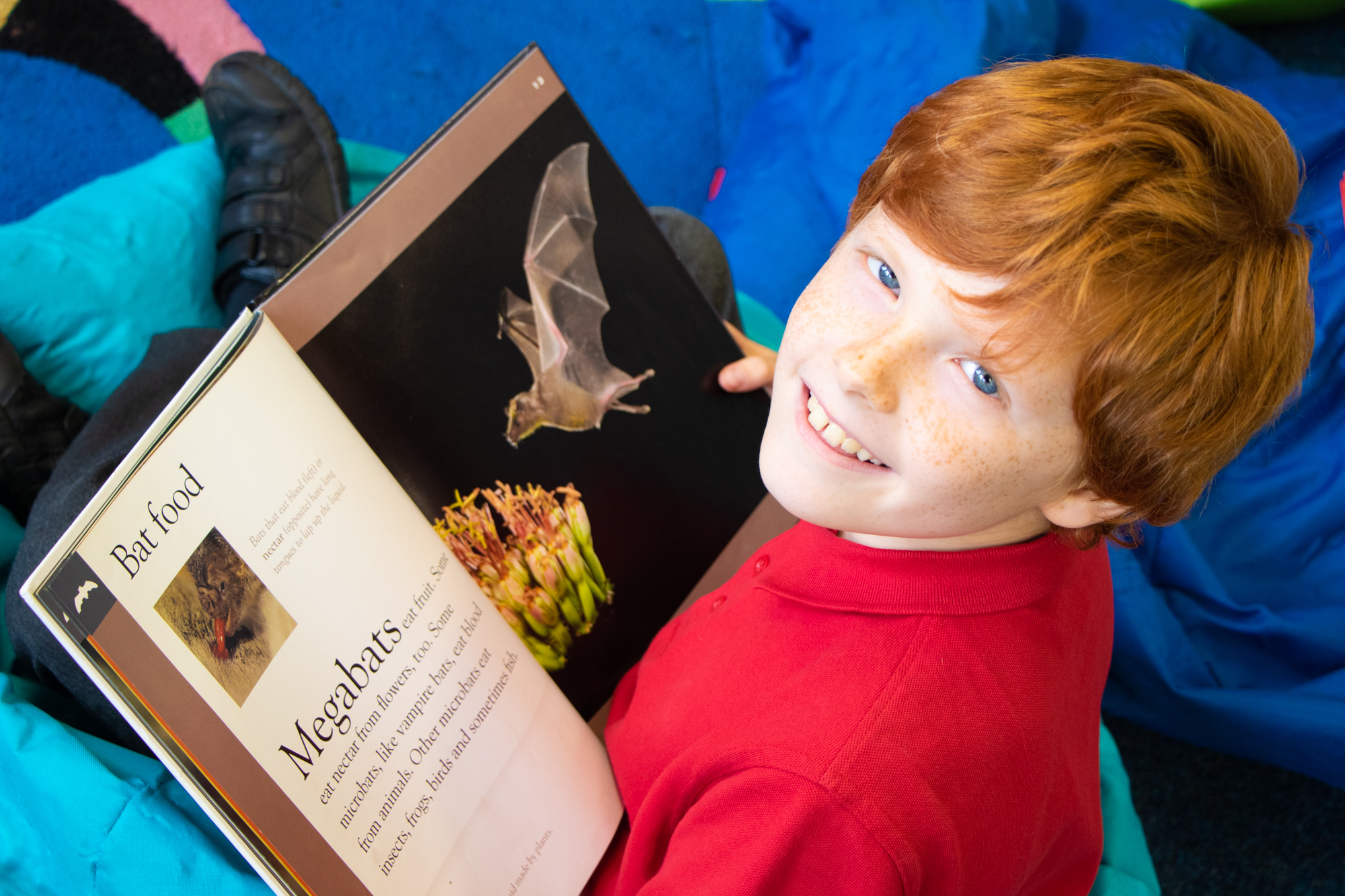
Central to learning is creating a life-long love of reading and books and at Aberford C of E Primary school, it is our belief that every child should be able to read for pleasure and to a high standard.
A child's reading skills are important to their success in school as they will allow them to access the breadth of the curriculum and improve their communication and language skills. Additionally, reading improves language and vocabulary, inspires imagination and gives everyone the opportunity to develop and foster new interests. Reading can be an enjoyable and imaginative time for children, opening doors to all kinds of new worlds for them. We want to open a pathway of wonder and joy for curious young minds and, through reading, give our children the opportunity to develop culturally, socially and emotionally as well as reaping the benefits academically.
We firmly believe that every child should be given the tools to develop into an enthusiastic and confident reader both at home and at school. Every child is taught a range of strategies to support their development to become a confident, independent reader.
The overarching aim for English in the national curriculum is to promote high standards of language and literacy by equipping pupils with a strong command of the spoken and written language and to develop their love of literature through widespread reading for enjoyment. read easily, fluently and with a good understanding
National Curriculum Aims for all pupils:
- develop the habit of reading widely and often, for both pleasure and information
- acquire a wide vocabulary, an understanding of grammar and knowledge of linguistic conventions for reading, writing and spoken language
- appreciate our rich and varied literary heritage
- write clearly, accurately and coherently, adapting their language and style in and for a range of contexts, purposes and audiences
- use discussion in order to learn; they should be able to elaborate and explain clearly their understanding and ideas
- are competent in the arts of speaking and listening, making formal presentations, demonstrating to others and participating in debate
The programmes of study for reading at key stages 1 and 2 consists of 2 dimensions:
- word reading
- comprehension (both listening and reading)
It is essential that teaching focuses on developing pupils’ competence in both dimensions; different kinds of teaching are needed for each.
Skilled word reading involves both the speedy working out of the pronunciation of unfamiliar printed words (decoding) and the speedy recognition of familiar printed words. Underpinning both is the understanding that the letters on the page represent the sounds in spoken words. This is why phonics should be emphasised in the early teaching of reading to beginners (ie unskilled readers) when they start school.
Good comprehension draws from linguistic knowledge (in particular of vocabulary and grammar) and on knowledge of the world. Comprehension skills develop through pupils’ experience of high-quality discussion with the teacher, as well as from reading and discussing a range of stories, poems and non-fiction. All pupils must be encouraged to read widely across both fiction and non-fiction to develop their knowledge of themselves and the world they live in, to establish an appreciation and love of reading, and to gain knowledge across the curriculum. Reading widely and often increases pupils’ vocabulary because they encounter words they would rarely hear or use in everyday speech. Reading also feeds pupils’ imagination and opens up a treasure house of wonder and joy for curious young minds.
It is essential that, by the end of their primary education, all pupils are able to read fluently, and with confidence, in any subject in their forthcoming secondary education
What does reading look like at Aberford C of E Primary School?
Reading is at the heart of our curriculum and at Aberford C of E Primary school, we aim to foster a love of language and reading. We, therefore, attach great importance to enabling our children to become fluent readers. We aspire to ensure that all children leave our school reading to the very best of their ability and ready for the challenge of the next stage in their education.
Early Reading: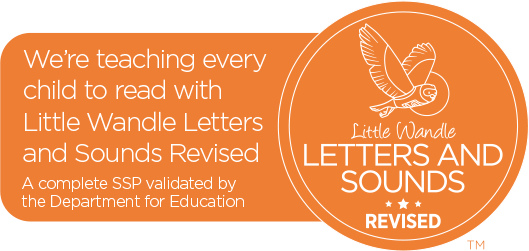
At Aberford C of E Primary School, we believe that all our children can become fluent readers and writers. This is why we teach reading through Little Wandle Letters and Sounds Revised, which is a systematic and synthetic phonics programme. We start teaching phonics in Reception and follow the Little Wandle Letters and Sounds Revised progression, which ensures children build on their growing knowledge of the alphabetic code, mastering phonics to read and spell as they move through school.
As a result, all our children are able to tackle any unfamiliar words as they read. At Aberford C of E Primary School, we also model the application of the alphabetic code through phonics in shared reading and writing, both inside and outside of the phonics lesson and across the curriculum. We have a strong focus on language development for our children because we know that speaking and listening are crucial skills for reading and writing in all subjects.
At Aberford C of E Primary School, we value reading as a crucial life skill. By the time children leave us, they read confidently for meaning and regularly enjoy reading for pleasure. Our readers are equipped with the tools to tackle unfamiliar vocabulary. We encourage our children to see themselves as readers for both pleasure and purpose.
Reading Lessons:
Children learn to read through encountering challenging texts which form the basis of our reading sessions. Our reading lessons focus on developing vocabulary, teachers modelling high-quality active reading, and lots of practice for children to develop their key skills. In Key Stage 2, these are to explain the meaning of words in context, retrieve information from the text, interpret the meaning of the text, and consider authorial choices. Children will recognise these vital key skills as our ‘VIPERS’ skills. In addition to these important techniques, Key Stage 1 children also learn to decode (see Phonics).
.png)
Our teaching of reading is effective. We place a great emphasis on children building their fluency of reading so that they are able to access and understand the challenging texts which form our reading curriculum.
Reading fluency
Children throughout the school have timetabled whole class reading sessions everyday. During these sessions, children not only build their reading fluency but also have an opportunity to explore vocabulary and delve deeper into a text using the VIPERS skills. In our wider curriculum lessons, children apply these skills in context, reading to learn, and acquiring lots of higher-order, academic vocabulary.
Independent Reading
As well as lots of practice at school, children are expected to read at home for 15 minutes per day (in KS1 and EYFS) and 20 minutes per day (in KS2). Children are expected to have their reading records signed by a parent or carer at least three times per week. Staff ensure that children also have lots of opportunities to practise at school, if home reading is ever an issue.
Reading
'You should write because you love the shape of stories and sentences and the creation of different words on a page. Writing comes from reading, and reading is the finest teacher of how to write.' - Annie Proulx
How writing supports our school's vision:.jpg)
At Aberford C of E Primary school, we love English and believe that this subject lies at the heart of all learning. Across the curriculum, we provide engaging and enjoyable opportunities for learners to develop and practise their literacy skills to enable them to become skilled communicators.
The study of English develops children’s abilities to listen, speak, read and write for a wide range of purposes and thus use language both to learn and communicate ideas, views and feelings. It enables children to express themselves creatively and imaginatively as they become enthusiastic and critical readers of stories, poetry and plays, as well as non-fiction and media texts. Children gain an understanding of how language and vocabulary work by looking at its patterns, structures and origins. They use their knowledge, skills and understanding in speaking, listening, reading and writing across a range of different situations and topics across the curriculum.
At Aberford C of E Primary School, we want our teaching of English to capture the imagination of our pupils. We aim to empower them by giving them the opportunities and guidance to develop their skills to be confident at speaking, listening, reading and writing. We aspire to create passionate authors who love to write and take pride in their learning and above all, we strive to embed a love of English that will enrich the lives of the children we teach.
How spelling supports our school's vision:
Spellings at Aberford play a crucial role in our school life. It is a skill that is required in every subject area to support with aspects such as communication and comprehension, whether this is through discussion or a written piece. We believe that if children are confidently communicating and understanding their learning, this will lead to a more focused, happier child who will: love language; write their ideas quickly and fluently; and will be more adventurous with the words they use to express themselves. Overall, spelling is a fundamental skill that will allow our children to achieve their very best and will leave our school with the necessary skills to succeed in the future.
How Grammar and Punctuation supports our school's vision:
Our aim is that all children will be encouraged to explore a wide range of vocabulary; developing a deeper understanding and more accurate and precise use of spelling, within their written work, as well as learn how to use correct grammatical forms so they can convey their thoughts in a creative yet purposeful manner.
National Curriculum Aims for all pupils:
- develop the habit of reading widely and often, for both pleasure and information
- acquire a wide vocabulary, an understanding of grammar and knowledge of linguistic conventions for reading, writing and spoken language
- appreciate our rich and varied literary heritage
- write clearly, accurately and coherently, adapting their language and style in and for a range of contexts, purposes and audiences
- use discussion in order to learn; they should be able to elaborate and explain clearly their understanding and ideas
- are competent in the arts of speaking and listening, making formal presentations, demonstrating to others and participating in debate
The programmes of study for writing at key stages 1 and 2 are constructed similarly to those for reading:
- transcription (spelling and handwriting)
- composition (articulating ideas and structuring them in speech and writing).
It is essential that teaching develops pupils’ competence in these two dimensions. In addition, pupils should be taught how to plan, revise and evaluate their writing. These aspects of writing have been incorporated into the programmes of study for composition.
Writing down ideas fluently depends on effective transcription: that is, on spelling quickly and accurately through knowing the relationship between sounds and letters (phonics) and understanding the morphology (word structure) and orthography (spelling structure) of words. Effective composition involves forming, articulating and communicating ideas, and then organising them coherently for a reader. This requires clarity, awareness of the audience, purpose and context, and an increasingly wide knowledge of vocabulary and grammar. Writing also depends on fluent, legible and, eventually, speedy handwriting.
What does writing look like at Aberford C of E Primary School?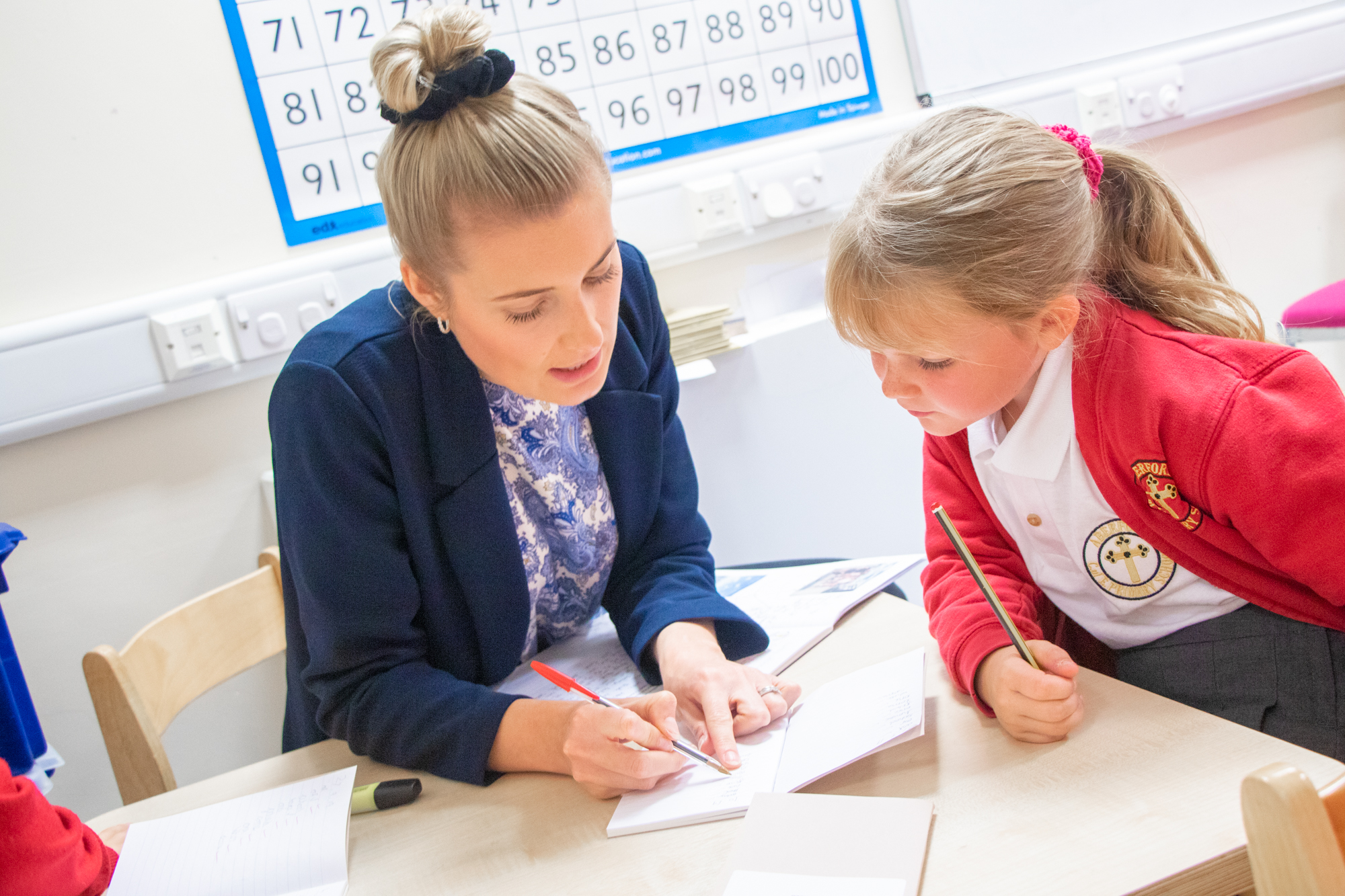
Children will experience a wide range of authors and text types during their time at Aberford C of E Primary School. In each year group, pupils will regularly hear high-quality and inspiring books being read to them and experience a range of writing styles and genre. These novels and books form the basis of our writing stimuli.
Our writing curriculum aims to develop ambitious and articulate authors that exist in each and every one of our children. They are encouraged to use their knowledge of texts to write for a variety of purposes such as: explanations, instructions, reports, balanced arguments, stories and poems.
Early Writing
The process of our writing begins in Early Years, as soon as a child can pick up a pencil and they then begin the journey of developing their skills and ability to confidently write about a variety of experiences. The process helps to empower our children to have the confidence and skills to be able to plan and write both fiction and non-fiction pieces, including poetry.
Throughout KS1 and KS2, writing is taught through a structured sequence where children learn the content and features of a model text linked to the purpose and genre they are focusing on (often by heart). Fluency with the sentence structures and content is well practised before children apply their learning to a new piece of writing, where they can demonstrate their newly found expertise. All pieces of writing are then published by the children, providing them with a purpose, an audience and a sense of pride. At Aberford, we value the importance of poetry both performance, reading and writing poetry and have adopted the 'Poetry Shed' (Literacy Shed) scheme of work for our poetry lessons.
Key Skills
Each year group begins the teaching of writing by focusing on the key skills which we expect children to master. These are rigorously taught and practised so that children develop their fluency with these skills. Writing is a creative process which can set the children’s imaginations alight. Teachers model how to capture these ideas using the key skills, in addition to always striving to use more ambitious vocabulary and sentences. Grammar and punctuation is taught both explicitly and implicitly within English lessons. We also ensure that grammar skills are effectively embedded in the children’s everyday work.
This leads to very high-quality outcomes of which both teachers and children are deservedly very proud.
Editing
Encouraging children to read their writing aloud also helps to develop their ability to edit and check with the aid of our editing system, “ARMS and COGS”.
Handwriting
We expect children to have very high standards of presentation in their writing, and teach a cursive style of handwriting. When children reach the expected standard, they are considered for a pen license. We follow the Nelson Handwriting Scheme throughout school, which supports consistency in teaching and high expectations.
Spelling
We teach spelling to build on children’s knowledge and understanding of phonics. At Aberford, Reception, Year 1 and Year 2 follow the Little Wandle Letters and Sounds Revised scheme. Year 3 to Year 6 follow the 'No Nonsense' spelling scheme. Each week, children memorise up to ten words from the statutory vocabulary and spelling rules which they are expected to spell correctly and have a weekly practise of applying rules and recalling these spellings.
Writing
'Speak in such a way that others love to listen to you. Listen in such a way that others love to speak to you.' - Annonymous
How Speaking and Listening supports our school's vision: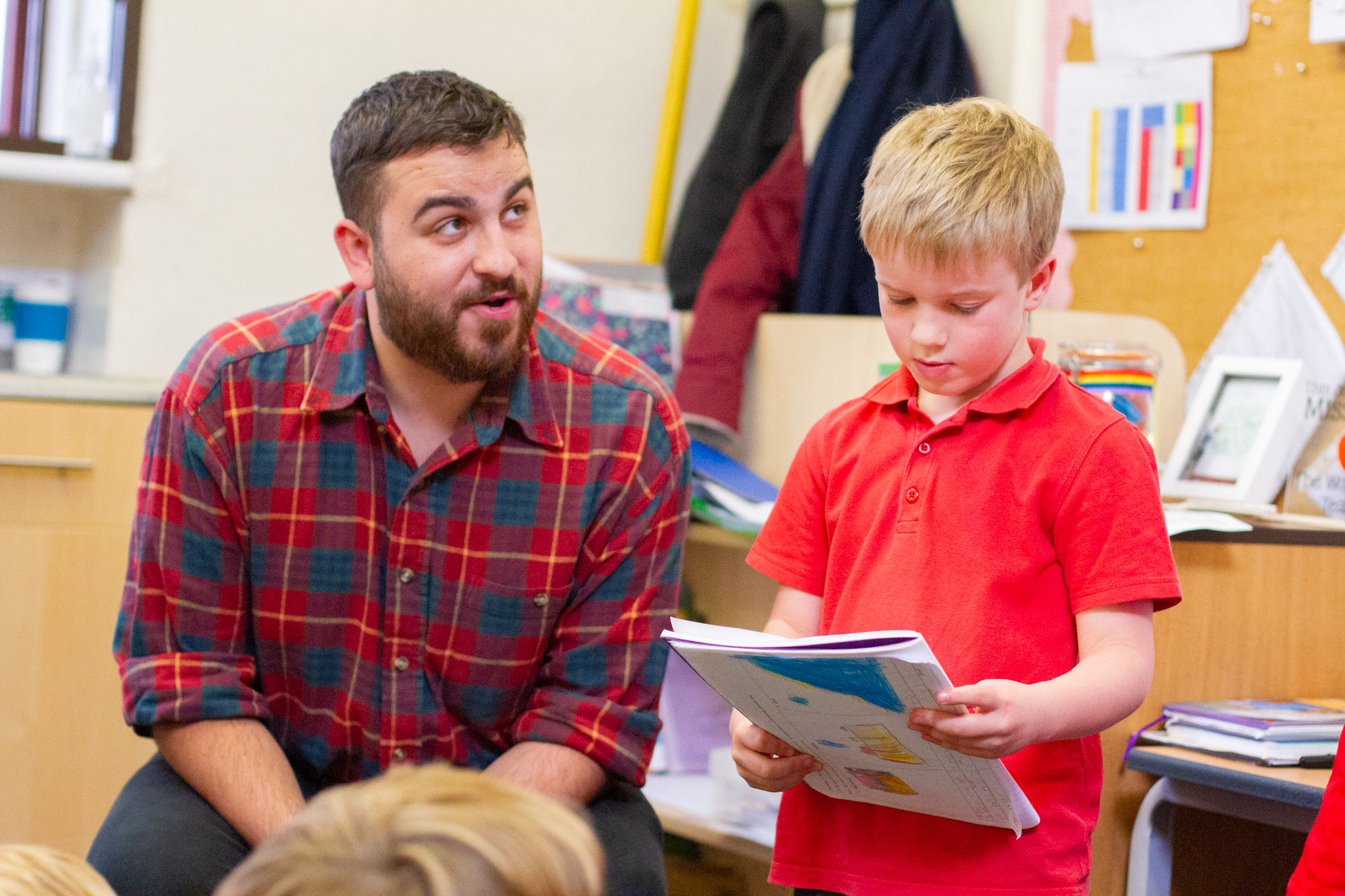
At Aberford C of E Primary School, opportunities to develop and improve children’s oracy skills are embedded not only in the English curriculum but also across the wider curriculum. Teachers are mindful in their planning of topics to involve speaking and listening wherever possible such as through discussions debates, performances and presentations. Children practise speaking for a variety of purposes and audiences, adapting their language appropriately as well as their intonation, tone, volume and actions. Dynamic use of questioning and different types of questions allow the children at Aberford to further improve their speaking skills. We also aim to expose our children to a rich diet of vocabulary and we strive to ensure children at Aberford leave us with a wealth of vocabulary to draw upon in their next stage of learning.
The National Curriculum for English reflects the importance of spoken language in pupils’ development across the whole curriculum – cognitively, socially and linguistically. Spoken language underpins the development of reading and writing. The quality and variety of language that pupils hear and speak are vital for developing their vocabulary, grammar and their understanding of reading and writing.
Speaking and Listening
"The more that you read, the more things you will know. The more that you learn, the more places you'll go!"
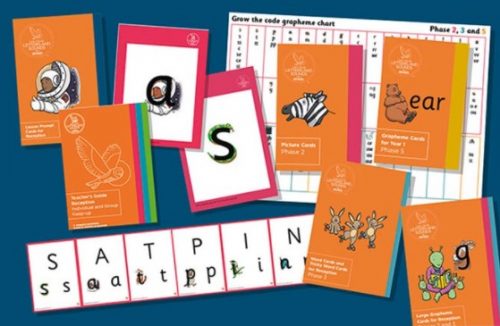
Phonics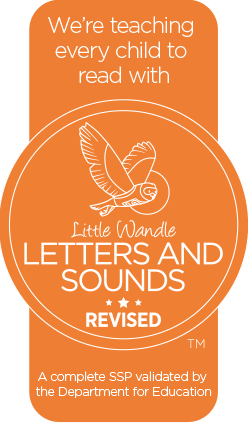
The development of children’s phonics is a key skill that impacts on children's progress as a reader and a writer. It is through their knowledge of phonics that children can read and write unfamiliar words by saying the sounds which match the letters in the words and then blending the sounds together.
Aims
Through a strong focus on the teaching of phonics we aim:
- To provide all children with a systematic and synthetic approach to teaching phonics which ensures all children achieve.
- To teach children all of the sounds (including alternative pronunciations) included in each phase of the Little Wandle Letters and Sounds Revised programme.
- To teach children how to orally blend spoken sounds to pronounce words.
- To read words by segmenting the sounds in a word and then blending the sounds back together.
- To write words by writing each of the sounds they can hear in a word.
- That children by the end of Year 1 will have developed a secure knowledge of all phonics sounds in order to develop as fluent readers to access and enjoy a range of books.
- To quickly identify children who need extra support and provide extra practice to enable them to keep up.
Structure of phonics and resources to teach phonics
Pupils in Reception, Year 1 and Year 2 have a daily phonics session, which follows the Little Wandle Letters and Sounds Revised structure of Revisit and Review, Teach and Practise, Practise and Apply and (for Reception and Year 1) Guided Practice (where children read a decodable book three times a week). Phonics is taught on a morning and lasts for 25 minutes in Reception and 25-30 minutes in Year 1 and Year 2. Any child who needs additional practice has daily 'Keep-up' support. 'Keep-up' lessons match the structure of class teaching, and use the same procedures, resources and mantras, but in smaller steps with more repetition, so that every child secures their learning.
Children in our Nursery also have daily phonics lessons, following the Little Wandle Nursery scheme. They tune into sound games, blend with sound games, play oral blending games, sing nursery rhymes during rhyme time and read stories to develop their language and vocabulary.
Revisit and Review – The children have the opportunity to re-cap sounds that have already been taught to them. They will then have the opportunity to practise reading words containing familiar sounds. The children will then practise reading the tricky words that are linked to their current stage in the phonics progression.
Teach and Practise – The new sound of the day is explicitly taught.
The new sound of the day will be taught and children will have the opportunity to practise orally segmenting and blending words alongside reading words containing the sound. During this time teachers will further support understanding by giving examples and definitions of some of the words in a sentence. A new tricky word will then be introduced and children will practise reading the word.
Practise and Apply – The children are given the opportunity to practise using the new sound, by reading and writing words/sentences containing this sound. The children will then further apply this sound by writing further words containing the sound of the day and a previously taught tricky word.
Guided Practice – Applying known sounds in fully decodable books.
During phonics teaching, we use phonics books (Collins Big Cat – Little Wandle for Letter and Sounds revised) to support children in applying their phonic knowledge to words and sentences by segmenting and blending sounds together. These phonics books are linked to the secure sounds that children know. In school children will be listened to read in a small group 3 times a week. Each time the group will be focusing on a different reading skill; fluency, prosody (readers voice) and comprehension (understanding the book). Once children have completed their three reads in school they will take their book home to share and consolidate their learning. This is a time for parents and carers to celebrate reading success with their children and share a love of reading together.
The reading lead will oversee the teaching of phonics and the delivery of the programme by monitoring the impact of this and by coaching and training the staff. At Aberford, we follow the Little Wandle Letters and Sounds Revised Programme. Further information about this phonics programme can be found at: https://www.littlewandlelettersandsounds.org.uk/resources/for-parents/
Further information about the progression of phonics from Upper Foundation (Reception) to the end of Year 1 is available via this pdf.
Interventions in phonics
Daily phonics interventions through regular and short 'Keep up' sessions will take place for identified pupils who require additional support. This will follow the same structure as above and will be a familiar routine to the children. Interventions will focus on targeted pupils identified through recent assessments and will be based around sounds that the pupils do not know, whilst also recapping sounds they do know to ensure they can achieve success.
Assessment of phonics
Phonics assessments will take place to assess pupils’ knowledge of the sounds that have been taught throughout each half term. It will also assess children’s decoding skills as they read unfamiliar words by applying their phonics or familiar words accurately. From the assessments, teachers will quickly identify the pupils who require further support and they will be provided with a targeted intervention. Daily assessment through the ‘speedy sounds’ using flash cards will also take place by the class teachers. The reading lead will oversee the assessment of phonics and will analyse data and will monitor the impact of interventions.
Phonics screening check
The phonics screening check is an assessment for the pupils in Year 1 which takes place during the final summer term. The check assesses the children’s ability to segment and blend words effectively by reading a series of real and non-words (‘alien words’). The check takes place on a one to one basis with the child and their class teacher. Results are submitted and parents are informed whether their child has met the required standard or not. Any child who does not meet the required standard in Year One will have the opportunity to re-take the check the following year during Year 2.
NEW to Little Wandle this year:
Year 2: The Little Wandle Phase 5 review and Bridge to spelling units provide a seamless link from the Little Wandle core programme to teaching spelling in Year 2. We have introduced this to our Year 2 children this year. Pupils will then embark on the fluency programme after October half term and we have purchased many new exciting books to support this teaching.
Nursery: Our phonics teaching now starts in Nursery and follows a very specific sequence that allows our children to build on their previous phonic knowledge and master specific phonic strategies as they move through school.
Phonics Documents
“Tell me and I’ll forget; show me and I may remember; involve me and I’ll understand.” - Benjamin Franklin
How drama supports our school's vision:
Our vision is for all pupils to leave Aberford C of E Primary School as confident, social and imaginative individuals, with an understanding of performance and presentation skills.
Drama is outlined in the 2014 National Curriculum under the ‘Spoken Language’ section, which says:
“All pupils should be enabled to participate in and gain knowledge, skills and understanding associated with the artistic practice of drama. Pupils should be able to adopt, create and sustain a range of roles, responding appropriately to others in role. They should have opportunities to improvise, devise and script drama for one another and a range of audiences, as well as to rehearse, refine, share and respond thoughtfully to drama and theatre performances.”
Drama activity is already a natural part of most children’s lives before they start school in the form of make-believe play, enabling them to make sense of their own identity by exploring meaningful fictional situations that have parallels in the real world. This can be utilised at school through structured play and drama to encourage pupils to learn actively and interactively throughout the primary years and across the curriculum.
What does drama look like at Aberford C of E Primary School?
Children like to move and to interact with others. In drama, we ask them to do exactly this. Rather than sitting still and listening, they are encouraged to move, speak and respond to one another. Pupils often respond more positively to the imaginative and multi-sensory learning offered by drama. This in turn helps them develop such skills as creativity, enquiry, communication, empathy, self-confidence, cooperation, leadership and negotiation. Most importantly, drama activities are fun – making learning both enjoyable and memorable.
Drama is ideal for cross-curricular learning and is a valuable tool for use in many subject areas. In particular, drama develops literacy skills – supporting speaking and listening, extending vocabulary and encouraging pupils to understand and express different points of view. Dramatic activity motivates children to write for a range of purposes.
Drama gives children opportunities to explore, discuss and deal with difficult issues and express their emotions in a supportive environment. It enables them to explore their own cultural values and those of others, past and present. It encourages them to think and act creatively, thus developing critical thinking and problem-solving skills that can be applied in all areas of learning. Through drama, children are encouraged to take responsible roles and make choices – to participate in and guide their own learning.
Drama activities include performance poetry, hot seating, freeze-framing, performing play scripts and acting in the role of characters. Drama is also undertaken as part of Collective Worship, Christmas Nativity and end of year performances. We also provide as many opportunities as possible for our children to watch live performances.
Our KS2 Productions
Over recent years, we are very proud to have performed;
- Oliver Twist
- Panto Pandemonium
- Tuishi Pamoja
- Beauty and the Beast
- Mary Poppins
- Aladdin
- Peter Pan
- Jungle Book
.jpg)